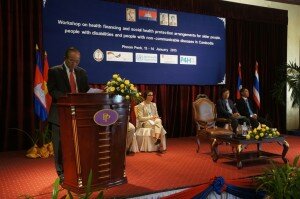Regional Workshop on Health Financing and Social Health Protection Arrangements for Vulnerable Groups
On 13 and 14 January, 2015, the regional workshop on health financing and social health protection arrangements for vulnerable groups such as older persons, persons with disabilities and persons with non-communicable diseases (NCDs) took place at the Phnom Penh Hotel.
It was hosted by the P4H initiative and jointly organized by the World Health Organization (WHO) and the Deutsche Gesellschaft für Internationale Zusammenarbeit (GIZ), in collaboration with the Cambodian Ministry of Health. The event was focused on the lower Mekong sub-region, including Thailand, Vietnam, Laos and Cambodia.
Representatives from several ministries of Cambodia participated including Economy and Finance; Interior: Education; Health; Labour; Social Affairs; and Public Functions. Other Cambodian participants included representatives from the Council for Agriculture and Rural Development, the Supreme National Economic Council, provincial health departments, civil society organisations and international development partners.
During the workshop, it was recognized that Cambodia has sound policies and strategies for addressing the needs of the concerned population groups. However, it emerged that implementation of these policies is hampered due to:
- insufficient coordination of, and collaboration, amongst stakeholders
- a fragmented system
- limited health infrastructure
- limited capacity to deal with the specific health problems of the concerned population groups
Suggested approaches to improve the access to health care for vulnerable groups include:
- reorienting the Cambodian health system to better address the health needs of older persons and persons with disabilities, and to successfully manage NCDs
- establishing an effective coordination mechanism and clarifying the roles of all stakeholders
- ensuring representation of vulnerable groups in envisaged initiatives
- stimulating involvement of other sectors to address the social determinants of health for older persons and persons with disabilities
- working towards universal health coverage for the entire population, but also to incorporate the needs of vulnerable groups in a financially accessible package of health services
- ensuring political commitment
- finding ways to raise additional earmarked funding, for instance taxes or sin taxes, as a source of revenue for health promotion and eventually provision of specific health services for older persons, persons with disabilities and NCDs.
Specific interventions considered helpful for enabling financial access to health care for vulnerable groups, are health equity funds (HEFs) and the IDPoor programme. However, the supply side should be able to render the required services for this access to be effective.
In general, the Cambodian Government is committed to ensuring affordable access to health care for its population. However, the health system has to deal with several challenges such as the increasing number of vulnerable persons, while resources are constrained. The number of persons aged 60 years or more will increase from 1.1 million in 2013 to 2 million in 2030 and there is a considerable overlap between age and NCDs as well as disabilities. Depending on the screening tool, it is estimated that at least 4.3% of the Cambodian population lives with a disability. Based on international experience, the WHO expects this number to be closer to 10 – 15%. As the likelihood of becoming disabled increases with old age, this number is likely to rise.
Vulnerable population groups have higher needs for health care, resulting in a higher chance of catastrophic spending and impoverishing health expenses. Their health spending is considerably higher than of other Cambodians: 3-fold among older persons, 5-fold for persons with disabilities, and 16 times higher for persons with chronic diseases. Moreover, they have limited access to health services. For this reason, there is a need to carefully consider the distribution of available resources in order to increase efficiency and use resources most reasonably.
![]()


